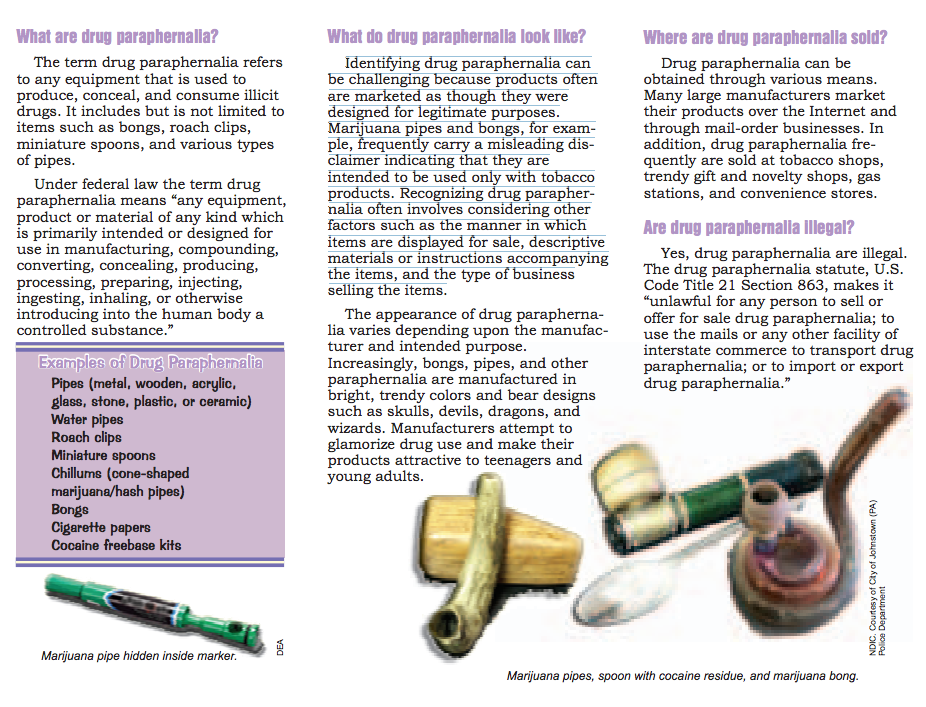Drug Paraphernalia Laws in the U.S.

By:
Almost half of the states in the U.S. have legalized marijuana for medical or recreational purposes. But while state laws offer some protection for users, there are still legal issues to consider, especially when it comes to travel.
It's federally illegal to possess, use, and sell marijuana, and transporting the substance across state lines can carry serious consequences. Additionally, if the state you're entering prohibits marijuana, you're subject to the laws and penalties that apply. But say you just have drug paraphernalia (pipes, bongs, grinders, etc.) — are you still at risk?
RELATED: Five Stoner Stereotypes That Are Offensive and Stupid
In a word, yes.
Under federal law, drug paraphernalia is defined as "any equipment that is used to produce, conceal, and consume illicit drugs," according to the U.S. Department of Justice. "It includes but is not limited to items such as bongs, roach clips, miniature spoons, and various types of pipes."
 U.S. Department of Justice - justice.gov
U.S. Department of Justice - justice.gov
And yes, if you get caught in possession of drug paraphernalia, you can face criminal fines and up to one year in jail in most cases. It's usually a misdemeanor, but repeat offenders and those busted for paraphernalia possession in a school zone, for example, could face felony charges.
If you live in a legal state, this definition of drug paraphernalia might strike you as somewhat bizarre. After all, smoke shops all across the country carry a colorful variety of glass pipes and bongs, papers and rollers, grinders, and products ostensibly designed to store drugs. If it's federally illegal to possess these items, how can these shops openly sell them?
 Reddit - imgur.com
Reddit - imgur.com
The answer isn't quite so simple. It is reasonable to assume that state and federal law enforcement agencies don't prioritize the prosecution of smoke shops and that litigation would be complex and costly for both parties in the end. There's essentially a loophole that allows these businesses to operate free of intervention, offering a lesson to traveling marijuana users as well:
It's not a "bong," it's a water pipe for tobacco use only!
That's the phrase you'll occasionally see plastered on the windows of the country's head shops: "For Tobacco Use Only." It's a way for businesses to protect themselves, saying that products are not intended to be used for the consumption of illicit drugs.
And for stoners on the go, it serves as an important lesson. If you're going to travel with drug paraphernalia, make sure you can safely say the same.
 Reddit - imgur.com
Reddit - imgur.com
"Identifying drug paraphernalia can be challenging because products often are marketed as though they were designed for legitimate purposes," the Justice Department wrote. "Recognizing drug paraphernalia often involves considering other factors such as the manner in which items are displayed for sale, descriptive materials or instructions accompanying the items, and the type of business selling the items."
What gets users in trouble is when they get caught with paraphernalia that has residue from illicit drugs on it. An unused pipe might get the pass, but a pipe caked with marijuana resin could lead to misdemeanor charges. So, if you want to safely travel across state lines, make sure your pipe is squeaky clean. It's not a foolproof solution—each case is different and circumstantial evidence could be used to justify a charge even if the product lacks residue—but it's a good practice.
What about traveling by air?
Again, federal law makes it clear that possession of drug paraphernalia is illegal. The Transportation Security Administration (TSA), the federal agency responsible for security at U.S. airports, doesn't specifically look for marijuana or paraphernalia, according its website, but if an agent finds potential evidence of criminal possession, they may refer the case to local law enforcement.
"Whether or not marijuana is considered 'medical marijuana' under local law is not relevant to TSA screening because TSA is governed by federal law and federal law provides no basis to treat medical marijuana any differently than non-medical marijuana," a spokesperson for the agency told Westword.
"Even if an item is generally permitted, it may be subject to additional screening or not allowed through the checkpoint if it triggers an alarm during the screening process, appears to have been tampered with, or poses other security concerns. The final decision rests with TSA on whether to allow any items on the plane."
RELATED: What Is Dabbing Marijuana?
Consider the context. If you're traveling to a state where marijuana is expressly forbidden, the risk of running into trouble is generally thought to be greater than if you were to travel from, say, California to Colorado. Other than that, the same rules apply: if you're product is residue-free, you're in a better position to defend a claim that the "paraphernalia" in question is for "tobacco use only." Still, it doesn't mean you're protected by law.
